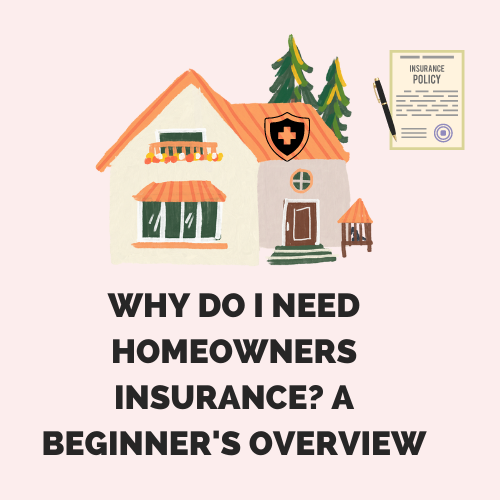Why Do I Need Homeowners Insurance? A Beginner’s Overview
If you’re buying your dream home or already have one, you may often think about homeowners insurance. When we talk about homeowners insurance, we often have many questions in our minds – What is homeowners insurance? Do I really need it? And the list goes on.
Well, to solve your problem, we are going to cover most of the frequently asked questions about homeowners insurance so you can make an informed decision.

What Is Homeowners Insurance?
Homeowners insurance is property insurance that involves the protection of your house, home contents, and even personal property in case of loss or damage. Also, homeowners insurance offers third-party coverage in case of an accident that may occur in the house or on the premises. You can also contact homeowners insurance companies to ask about a certain plan that suits your needs and options.
Do I Need Homeowners Insurance?
Although it is not mandatory to have homeowners insurance, if you are planning to buy a home through a mortgage, it is crucial to have one. Why? Because they wish to safeguard the money they have invested in the project. Home insurance pays for the replacement cost of your home if something bad happens to it, such as a lightning strike, fire, tornado, etc.
Thus, if one person has insurance and something occurs, it is the insurance company that bears the brunt. However, if there is no insurance, the lost money belongs to the lender who invested money in the home and might not be able to recover the loan in case of loss.
What Does a Homeowners Insurance Policy Cover?
A homeowners insurance policy covers certain standard costs. Here, we’ll talk about what areas are covered in the policy.
Home Damage Coverage
While many people purchase homeowners insurance to protect them from liability, it also provides coverage for damages to the interior and exterior of the home due to fire, hurricanes, lightning, and vandalism. However, it does not cover damages due to flooding, and earthquakes, as well as those because of negligence and years of neglect. Other outbuildings, such as garages and sheds that are not a part of the home or a similar structure, require separate coverage under similar provisions.
Personal Belongings Protection
Your insurance also covers personal belongings such as clothes, furniture, and refrigerators in case they are damaged by a calamity. You can even get compensated for items lost outside your home. Most insurance service providers will offer you 50% to 70% of the insured value of your home for your personal property. For valuable items like jewelry or antiques, you may require additional protection from riders or individual insurance policies.
Liability Coverage
Personal liability coverage protects you when someone gets injured on your compound or if you or your pet is at fault. For instance, if your dog bites a person, this insurance pays the bills of the affected individual. The amount that should be insisted on is at least $300,000 for liability coverage. However, if you want, you can purchase an umbrella policy for additional security.
Temporary Living Expenses
If you can’t live at your home due to damage, your homeowners insurance can cover extra living costs such as meals, rent, hotel stays while your home is being repaired. It’s important to note that this coverage has limits, but you can always increase them by paying a higher premium.
What Amount of Homeowners Insurance Should I Get?
Homeowners insurance companies can help you determine how much homeowners insurance you need and how much it may cost. However, you can also calculate an estimate.
You need to determine the value of your home and everything you have. Then, ask your agent how much it would cost to rebuild your home. But, ensure that your personal property is not more than the coverage limit, which is usually a fraction of the home’s value. Now, select Replacement cost for complete replacement of the item and consider extra living expenses in case of an emergency. Seek sufficient liability coverage, which is usually at least $300,000 to $500,000.
However, you can also search for more ways to cut the cost of homeowners insurance such as multi-policy discounts or energy-efficient homes.

